The Taliban has banned the sound of women's voices in Afghanistan. But these women want to be heard
By South Asia correspondent Ellie Grounds and Som Patidar
Topic:Women’s Rights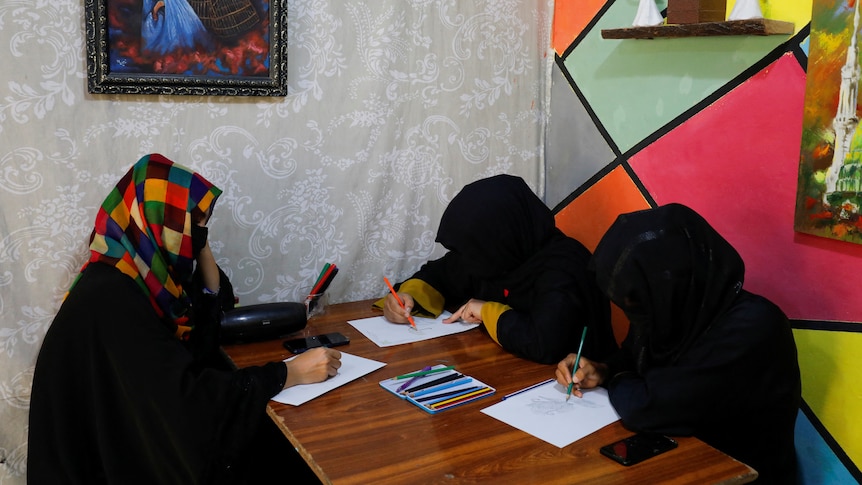
Afghan women's voices are now not allowed to be heard in public. (Reuters: Ali Khara)
abc.net.au/news/afghanistan-taliban-ban-women-voice-but-some-want-to-be-heard/104359548Link copied
Share article
When the Taliban introduced a law essentially banning the sound of women's voices in public last month, the world was shocked.
But those who live under the regime in Afghanistan, were not surprised.
"Every day we are expecting a new law," Zahra* told the ABC.
"Every day we are expecting a new, unfortunately, limitation for women."
For her, this kind of crackdown was inevitable.
But being somewhat mentally prepared for it did not soften the detrimental blow to her mental health.
"Every day we are losing hope," she said.
"Imagine how painful it is, how disappointing it is, that me, as a human, I cannot have my own voice.
"They are not accepting us as human."
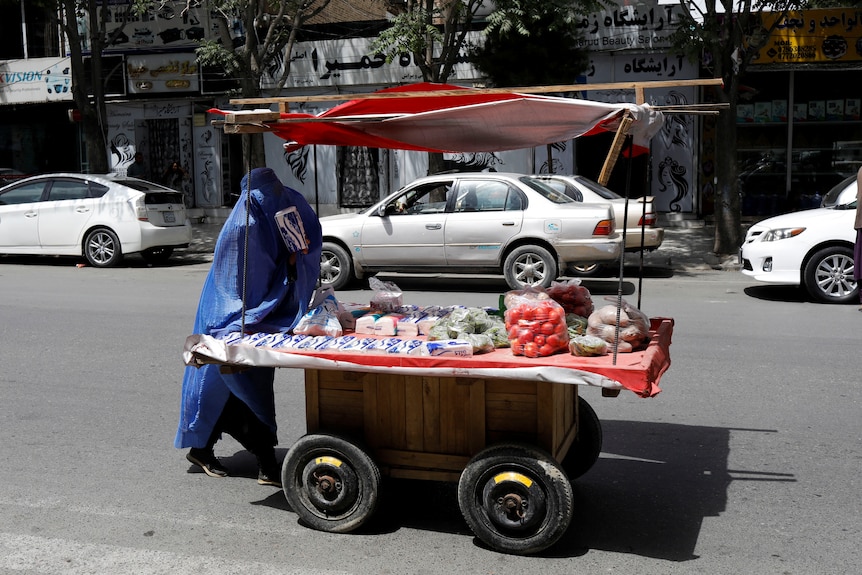
Women were banned from workplaces in Afghanistan. (Reuters: Ali Khara)
The ban forbids women from singing, reciting poetry or reading aloud in public because their voices are considered an "intimate" part of the body.
It is just one of several crackdowns on freedoms in the Taliban's new "vice and virtue" law enacted in late August — the first formal declaration of rules that had been decreed previously.
Women must now also cover their entire bodies at all times in clothing that cannot be thin, short or tight, including covering their faces in order to prevent "temptation".
Publishing images of living beings and viewing images or videos of them on computers or phones has also been prohibited, throwing the fate of Afghanistan's media outlets into serious jeopardy.
Taliban orders Afghan women to cover faces
Photo shows Two women in full-face coverings sit on the ground in an arid landscape
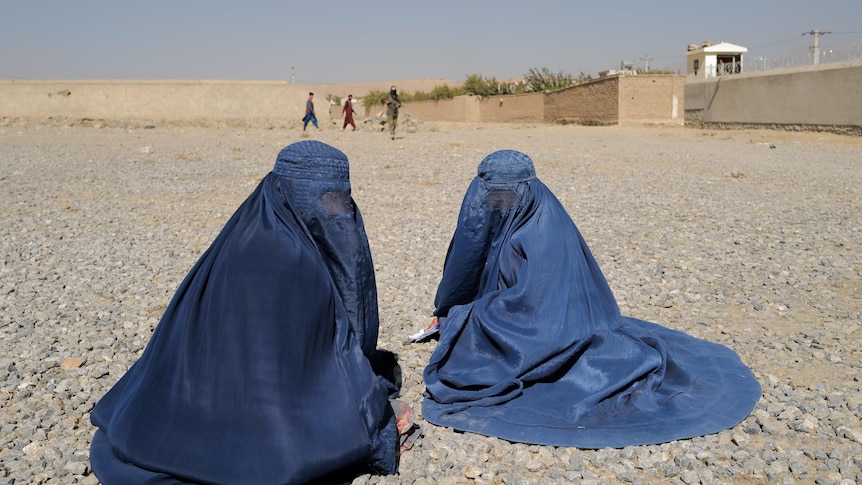
A violation of the decree would mean that the woman's mahram would be imprisoned or fired from government jobs.
Recording female voices then broadcasting them outside private homes has also been forbidden.
It means the women who have chosen to speak with the ABC, via recorded audio interviews or voice notes, have done so at great personal risk.
But despite the possibility of severe punishment, they said they are not willing to be silenced.
They all told the ABC they want the world to know the brutal, bleak truth of life as a woman in Afghanistan.
To mitigate risk of punishment, most wanted to be anonymised to protect their identity.
But Sodaba Noorai from Kabul was an outlier — she asked to be named.
"I chose to speak to you despite the ban on public speaking for women because I believe that is essential to share our stories and raise awareness about our struggles," she said in a voice message to the ABC.
"Identifying myself is a risk, but I am willing to take [it] because silence only allows our suffering to continue.
"[The new law] is deeply concerning and has created an atmosphere of fear and oppression for women. It restricts our freedom and it undermines our rights to education, work and basic autonomy."

The Taliban has established several laws against women since taking over. (Reuters: Sayed Hassib)
Ms Noorai lost her job when the Taliban returned to power in August 2021 and swiftly implemented a strict interpretation of Sharia — Islam's religious law — that curtailed many freedoms for women, including removing females from many workplaces and banning girls from secondary education.
She said she now receives the equivalent of $107 per month from the "government", an amount she deems insufficient for women to meet basic needs.
She wanted the international community to notice, and then act on, the bravery of Afghan women choosing to speak.
"I hope that my speaking out can lead to a dialogue that might bring about change and support Afghan women in Afghanistan."
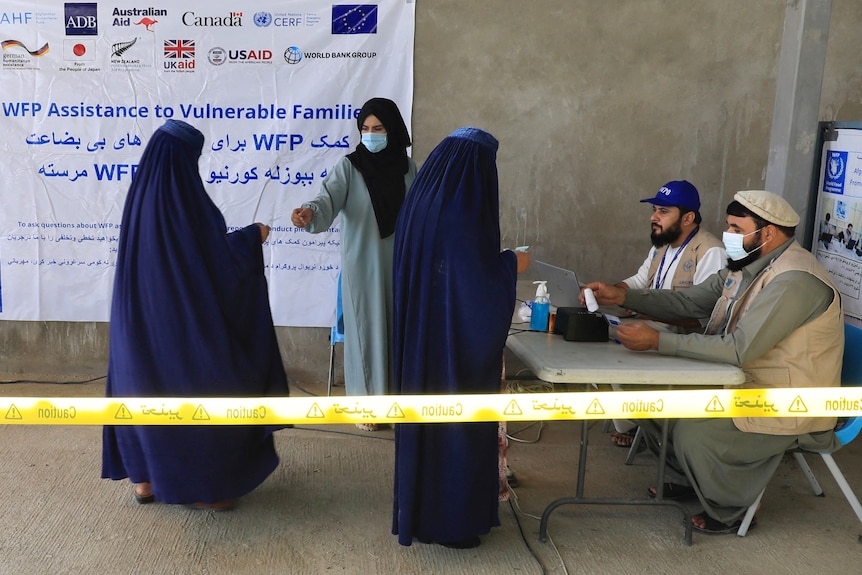
Afghan women rely on the assistance of the government and aid organisations. (Reuters: Sayed Hassib)
Samira's* protest group, which has had to adapt its protest methods with each new law, is still posting videos on its Instagram account of Afghan women speaking out.
"We have some fear, but we do not stop," she said.
Like Ms Noorai, she wants international intervention.
"If the Taliban continues like this and the world remains silent, we will see a human crisis in Afghanistan," she said.
"They have to not accept the Taliban's government as a political legitimacy."
Fears freedoms will be further limited
Amina*, who lives in Kabul and is the only one in her family who has a job — which she does secretly online — has already had a near run-in with the Taliban over the new crackdown.
"One time, when I left home, I needed to contact a family member on the phone," she told the ABC via text message, for fear of having her voice recorded.
"But out of fear of being spotted by the Taliban, I refrained from making the call. I was afraid of facing any harsh reaction from them.
"No woman in Afghanistan can tolerate this reality."
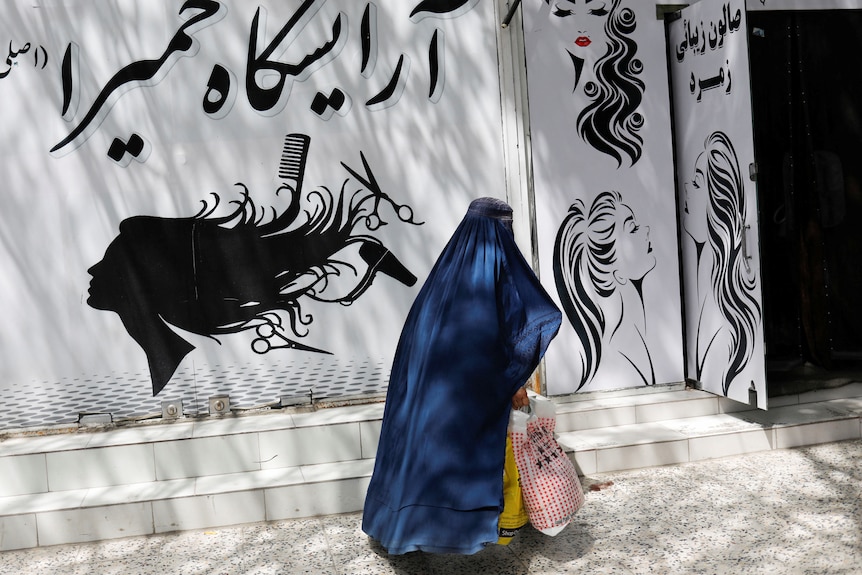
Women fear future laws will ban them from stepping outside their homes. (Reuters: Ali Khara)
Samira*, who lives in Ghazni province in the country's south-east, has already heard stories of women being taken to prison for defying the new laws.
Noori* has heard of Taliban soldiers stopping cars with women inside, and fining them for being outside their house without a man.
She was personally pulled aside on the street along with her sister and questioned for half an hour about why she wasn't wearing a full face covering.
"They wanted to speak to my father, they wanted to arrest us," she told the ABC.
"Somehow we managed to escape and come home. It was [one of the worst] experiences of my life."
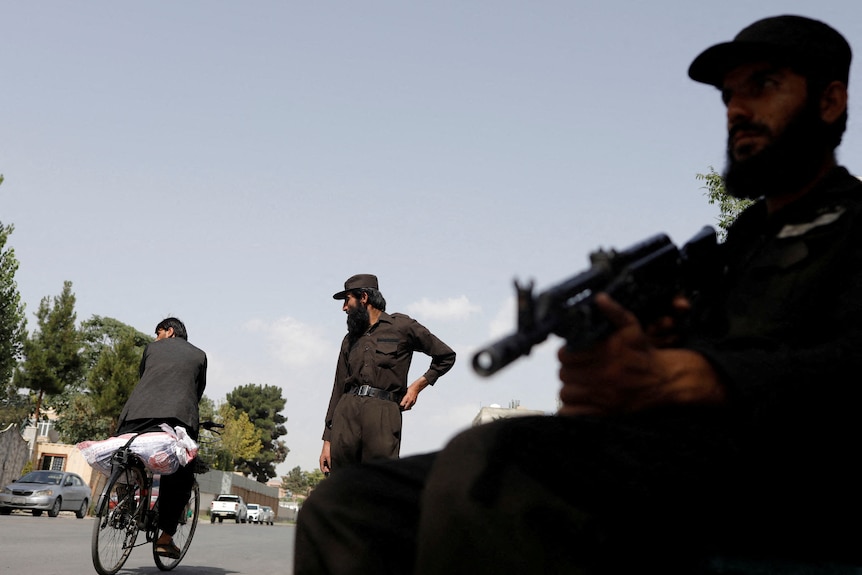
Taliban soldiers have checkpoints around Afghanistan. (Reuters: Ali Khara)
Zahra, who is from same province, is worried that, soon enough, one of the last remaining freedoms for women — exiting their homes — will also be taken away.
"The only thing that now we have in Afghanistan is a small opportunity for us to go out of our homes and at least walk on the street," she explained.
"I'm thinking that one day they may have a new law regarding this, that females are not allowed to come out from their home. They should stay there."
'Completely dark, with no light or way out'
Amina's description of life for women in Afghanistan paints a distressing image.
"I would describe it as living in a large house that is completely dark, with no light or way out. Enduring this darkness is like enduring great suffering."
It makes clear the kind of toll this mandated life is taking on the mental health of every woman the ABC spoke to.
Zahra says the cruel oppression of the Taliban seeps into every moment of her life — even while she's unconscious.
"Two or three nights ago, I was dreaming about my little sister, that the Taliban [were] taking her from me by force," she said.
"We cannot even be calm or comfortable while we are sleeping. We are seeing the Taliban in our dreams."
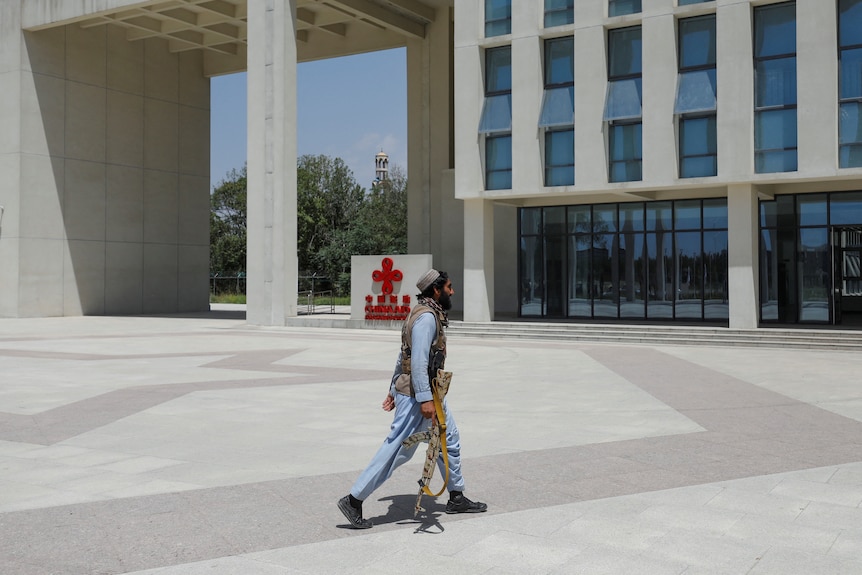
The Taliban has banned women from higher education at institutions like Kabul University. (Reuters: Ali Khara)
Zahra's sister was in her final semester of her medical degree in 2022 when the Taliban banned women from high education.
She said it nearly drove her sister to suicide.
"She was telling me, 'Life has no meaning for me. I want to die, I want to kill myself because I don't have any other hope for staying alive,'" Zahra recounted.
For others, the defiance is what keeps them going.
"If I do not [protest], I don't think I have peace in my inner self," Samira said.
"Mentally, I am not good if I do not protest.
"It's the only way that I can defend my rights, and the voice of every girl and woman."
*Names have been changed to protect identity.
Topic:Women’s Rights
Afghan women's voices are now not allowed to be heard in public. (Reuters: Ali Khara)
abc.net.au/news/afghanistan-taliban-ban-women-voice-but-some-want-to-be-heard/104359548Link copied
Share article
When the Taliban introduced a law essentially banning the sound of women's voices in public last month, the world was shocked.
But those who live under the regime in Afghanistan, were not surprised.
"Every day we are expecting a new law," Zahra* told the ABC.
"Every day we are expecting a new, unfortunately, limitation for women."
For her, this kind of crackdown was inevitable.
But being somewhat mentally prepared for it did not soften the detrimental blow to her mental health.
"Every day we are losing hope," she said.
"Imagine how painful it is, how disappointing it is, that me, as a human, I cannot have my own voice.
"They are not accepting us as human."
Women were banned from workplaces in Afghanistan. (Reuters: Ali Khara)
The ban forbids women from singing, reciting poetry or reading aloud in public because their voices are considered an "intimate" part of the body.
It is just one of several crackdowns on freedoms in the Taliban's new "vice and virtue" law enacted in late August — the first formal declaration of rules that had been decreed previously.
Women must now also cover their entire bodies at all times in clothing that cannot be thin, short or tight, including covering their faces in order to prevent "temptation".
Publishing images of living beings and viewing images or videos of them on computers or phones has also been prohibited, throwing the fate of Afghanistan's media outlets into serious jeopardy.
Taliban orders Afghan women to cover faces
Photo shows Two women in full-face coverings sit on the ground in an arid landscape
A violation of the decree would mean that the woman's mahram would be imprisoned or fired from government jobs.
Recording female voices then broadcasting them outside private homes has also been forbidden.
It means the women who have chosen to speak with the ABC, via recorded audio interviews or voice notes, have done so at great personal risk.
But despite the possibility of severe punishment, they said they are not willing to be silenced.
They all told the ABC they want the world to know the brutal, bleak truth of life as a woman in Afghanistan.
To mitigate risk of punishment, most wanted to be anonymised to protect their identity.
But Sodaba Noorai from Kabul was an outlier — she asked to be named.
"I chose to speak to you despite the ban on public speaking for women because I believe that is essential to share our stories and raise awareness about our struggles," she said in a voice message to the ABC.
"Identifying myself is a risk, but I am willing to take [it] because silence only allows our suffering to continue.
"[The new law] is deeply concerning and has created an atmosphere of fear and oppression for women. It restricts our freedom and it undermines our rights to education, work and basic autonomy."
The Taliban has established several laws against women since taking over. (Reuters: Sayed Hassib)
Ms Noorai lost her job when the Taliban returned to power in August 2021 and swiftly implemented a strict interpretation of Sharia — Islam's religious law — that curtailed many freedoms for women, including removing females from many workplaces and banning girls from secondary education.
She said she now receives the equivalent of $107 per month from the "government", an amount she deems insufficient for women to meet basic needs.
She wanted the international community to notice, and then act on, the bravery of Afghan women choosing to speak.
"I hope that my speaking out can lead to a dialogue that might bring about change and support Afghan women in Afghanistan."
Afghan women rely on the assistance of the government and aid organisations. (Reuters: Sayed Hassib)
Samira's* protest group, which has had to adapt its protest methods with each new law, is still posting videos on its Instagram account of Afghan women speaking out.
"We have some fear, but we do not stop," she said.
Like Ms Noorai, she wants international intervention.
"If the Taliban continues like this and the world remains silent, we will see a human crisis in Afghanistan," she said.
"They have to not accept the Taliban's government as a political legitimacy."
Fears freedoms will be further limited
Amina*, who lives in Kabul and is the only one in her family who has a job — which she does secretly online — has already had a near run-in with the Taliban over the new crackdown.
"One time, when I left home, I needed to contact a family member on the phone," she told the ABC via text message, for fear of having her voice recorded.
"But out of fear of being spotted by the Taliban, I refrained from making the call. I was afraid of facing any harsh reaction from them.
"No woman in Afghanistan can tolerate this reality."
Women fear future laws will ban them from stepping outside their homes. (Reuters: Ali Khara)
Samira*, who lives in Ghazni province in the country's south-east, has already heard stories of women being taken to prison for defying the new laws.
Noori* has heard of Taliban soldiers stopping cars with women inside, and fining them for being outside their house without a man.
She was personally pulled aside on the street along with her sister and questioned for half an hour about why she wasn't wearing a full face covering.
"They wanted to speak to my father, they wanted to arrest us," she told the ABC.
"Somehow we managed to escape and come home. It was [one of the worst] experiences of my life."
Taliban soldiers have checkpoints around Afghanistan. (Reuters: Ali Khara)
Zahra, who is from same province, is worried that, soon enough, one of the last remaining freedoms for women — exiting their homes — will also be taken away.
"The only thing that now we have in Afghanistan is a small opportunity for us to go out of our homes and at least walk on the street," she explained.
"I'm thinking that one day they may have a new law regarding this, that females are not allowed to come out from their home. They should stay there."
'Completely dark, with no light or way out'
Amina's description of life for women in Afghanistan paints a distressing image.
"I would describe it as living in a large house that is completely dark, with no light or way out. Enduring this darkness is like enduring great suffering."
It makes clear the kind of toll this mandated life is taking on the mental health of every woman the ABC spoke to.
Zahra says the cruel oppression of the Taliban seeps into every moment of her life — even while she's unconscious.
"Two or three nights ago, I was dreaming about my little sister, that the Taliban [were] taking her from me by force," she said.
"We cannot even be calm or comfortable while we are sleeping. We are seeing the Taliban in our dreams."
The Taliban has banned women from higher education at institutions like Kabul University. (Reuters: Ali Khara)
Zahra's sister was in her final semester of her medical degree in 2022 when the Taliban banned women from high education.
She said it nearly drove her sister to suicide.
"She was telling me, 'Life has no meaning for me. I want to die, I want to kill myself because I don't have any other hope for staying alive,'" Zahra recounted.
For others, the defiance is what keeps them going.
"If I do not [protest], I don't think I have peace in my inner self," Samira said.
"Mentally, I am not good if I do not protest.
"It's the only way that I can defend my rights, and the voice of every girl and woman."
*Names have been changed to protect identity.
No comments:
Post a Comment